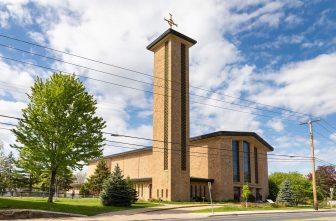Of the many changes in becoming an auxiliary bishop, one is that I am now pastor of a much smaller parish, St. Francis of Assisi in Lake St. Croix Beach. I have transitioned from Stillwater, where I had two parishes and seven Masses on the weekend, to one parish and two Masses on the weekend.
The lighter schedule enables me to extend myself as a bishop. But having this connection to a parish also keeps me in touch with the people of God and the pulse of our culture.
Understandably, a big concern right now is peace (Hamas attack, Israel’s response grip global and local communities, Mourners grieve the loss of loved ones amid calls for prayers for war-torn Holy Land). If you’re like me, one of the first things you think of when you think about the patron of my small parish, St. Francis, is his prayer for peace.

Prayer continues to be one of the most important things we can do to promote peace. Striving to be an instrument of peace is another thing we can do. While we can doubt that our actions will affect world peace, it was St. Teresa of Kolkata who once said, “The way you help heal the world is you start with your own family.”
We are called to pray for peace. Pope Francis has declared Oct. 27 to be a day of prayer and fasting for peace in our world. Even if you are reading this after Oct. 27, consider taking on a day of prayer and fasting for those who do not have the blessing of living in peace. Our prayers have power. And as the Lord teaches us in the New Testament, fasting has great power as well. I usually recommend to parishioners that when it comes to fasting, simply imitate what the Church says about fast days. We can still have one main, modest meal. Then, two much smaller meals, with no eating in between.
Besides prayer, fasting was another practice that St. Francis valued. Since his prayer for peace was one of the few things I knew about St. Francis when I became pastor of my new parish, I figured I needed to learn more. So, I read G.K. Chesterton’s biography of the great saint, simply titled: “Saint Francis of Assisi.” I learned that St. Francis was a peacemaker in part because he was a man of love, prayer and fasting.
One day as St. Francis was riding his horse in the countryside, he came upon a leper. Most would have made a wide turn around the leper or maybe even a U-turn. St. Francis jumped off his horse, went up to the man and hugged him. Additional stories of St. Francis reveal the value he placed on penance and fasting. Another time when he was traveling, he came upon a patch of rose bushes and discerned that he needed more penance, so he jumped in the bushes. Miraculously, there were no thorns in those particular rose bushes. St. Francis lived a life of fasting and penance because he knew that we must make room for sacrifice if we hoped to imitate Christ. A few weeks ago, at a Sunday Mass, we had St. Paul’s famous line from his Letter to the Philippians. St. Paul says, “Though Jesus was in the form of God, (he) did not regard equality with God something to be grasped. Rather, he emptied himself” (Phil 2:6-7). It struck me that this is how St. Francis lived his life. St. Francis, like the Lord, was never about filling himself up, but about emptying himself out.
St. Francis was also a man of the Eucharist. As Archbishop Hebda wrote last year in his post-synodal letter, it’s in the holy Eucharist that Jesus gives himself despite his suffering. Similarly, we are given the power to give of ourselves through the Eucharist (paraphrasing No. 36 from the Catechism of the Catholic Church). The holy Eucharist enables us to enter the practices of prayer and fasting because the Eucharist demands that we live our lives not for ourselves, but for God and others.
Let us continue to pray for peace in the Holy Land and in the world. If we desire to work for peace, we would do well to imitate the example of St. Francis. It starts in our hearts and in our communities. Ask the Lord to make you an instrument of his peace, and like St. Francis, spend some extra time praying and fasting.
St. Francis’ prayer for peace
Lord, make me an instrument of your peace.
Where there is hatred, let me sow love;
where there is injury, pardon;
where there is doubt, faith;
where there is despair, hope;
where there is darkness, light;
and where there is sadness, joy.
O Divine Master, grant that I may not so much seek
to be consoled as to console;
to be understood as to understand;
to be loved as to love.
For it is in giving that we receive;
it is in pardoning that we are pardoned;
and it is in dying that we are born to eternal life.
Amen.



